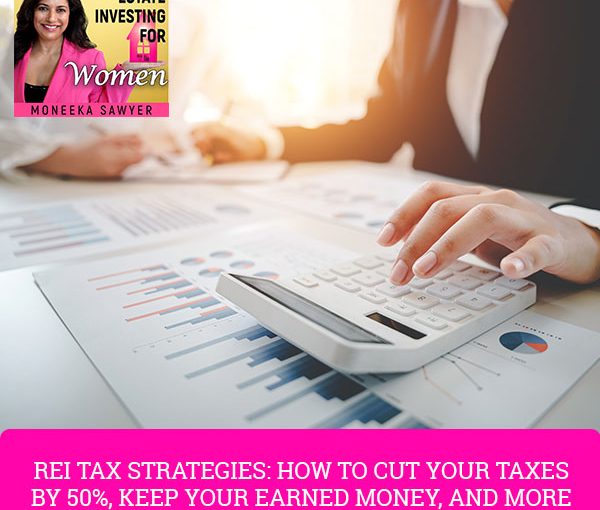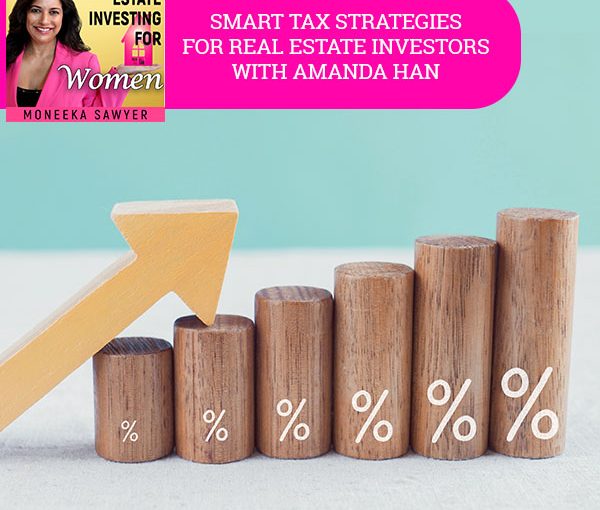REI Tax Strategies: How To Cut Your Taxes By 50%, Keep Your Earned Money, And More With Lorraine And Jim Conaway
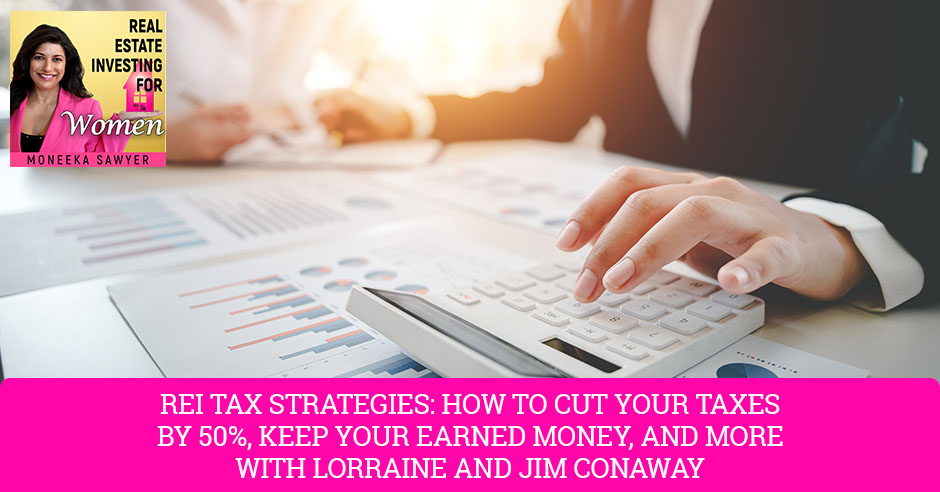
Taxes are inevitable, especially as an entrepreneur and investor. But it doesn’t have to be so difficult and painful to deal with; with the right strategies, you can even cut your taxes by up to 50%. Today we have Lorraine and Jim Conaway to share with us the different REI strategies for reducing your taxable income, keeping the money you earn, and more. Lorraine and Jim share their financial experience and how they have helped many clients with their tax strategies and saved them a lot of pain. They also share their journey in the industry—the ups and downs—and how, through the years, they have discovered what really matters to them. Don’t miss the opportunity to start controlling your finances smartly. Tune in now!
—
Watch the episode here
Listen to the podcast here
REI Tax Strategies: How To Cut Your Taxes By 50%, Keep Your Earned Money, And More With Lorraine And Jim Conaway
Real Estate Investing For Women
Using their extensive experience, knowledge, and success in the world of tech strategies, real estate investing, and other wealth vehicles, Jim and Lorraine used their straightforward, big-hearted style to guide thousands to ignite their unique wealth formula. With decades of success, in designing and implementing customized wealth solutions, they appreciate that success is truly about education support and the art of supercharging your unique style of wealth accumulation. —Jim and Lorraine, welcome to the show again. How are you?We’re doing great. How are you, Moneeka?
I’m so glad to have you guys here.
Moneeka, you were doing such a great thing for your entire community. I tuned in to a couple of your shows, and they’re so informative. They’re very educational and they’re there to help your community. That’s just really good that you’re doing that for women. I love it.
Thank you, Lorraine. Every once in a while, I’ll be like, “I don’t feel like recording now.” Recording is my favorite thing to do, just so you know. When I have those moments, I’m like, “I want to see my ladies,” so I get out there and I do it. It really is fun for me. Thank you for that. Lorraine. You and Jim are two of my favorite people in the world, but Jim, I do like Lorraine better. I want you to know that.
I’m used to people feeling me that way.
You probably feel that way, too. I think so.
When somebody likes the bad dad joke-type approach, then I become the favorite.
I think my husband prefers you, but I’m a fan of Lorraine. Lorraine is a friend of mine. I feel like we’re really close friends. I love you, guys. I recommend you frequently to my ladies. One of the things that have come back several times is, did you know they’re being sued or did you know they’re being investigated? My ladies, through my direction, have been taught you have to do your due diligence. I can only recommend so much, and then you have to do your due diligence. I have to confess, I’m proud of them for coming back to me with that. They helped me to find other people that I might have on my show who do have issues that I didn’t know about.
It’s a great community thing that we all keep our eyes on the ball for each other and people keep me informed. The issue here for me is that I know you and your integrity. I personally do business with you and I love you, guys, personally. I know that in this particular case, interesting, bad things happen to really good people. I would like you to help us to understand what happened so my ladies know the story the same way that I do.
I wanted to share the story because it is the actual of what happened. Jim and I were very excited to be faculty for a New York Bestselling Author way back in ‘08. We still have that amazing relationship now. What happened is we were financial planners at that time, and we personally have been real estate investors. In 2023, we will be 29 years that we’ve been real estate investors. Back then, we were real estate investors and we were financial planners, and we came across turnkey real estate. We went out and visited these turnkey providers, and they said, “If you allocate part of the portfolio to real estate, which we love real estate, and I’m sure your community does, too, you can also get a referral fee and expand our business model.”
We said yes. We had so many people that the vendors couldn’t keep up, so we expanded to new vendors providing turnkey real estate. One vendor couldn’t scale up, even though he said, “I can do it.” We flooded him with clients. It took one client, a niece from Germany who visited her aunt, and said, “What? Your property is not rehabbed. It’s not finished. We are going to sue the vendor.” They sued the real estate developer. What was really sad is they sued title, escrow, us, and everybody. It was like, “We got included in that, and we didn’t get paid. We weren’t the developer.”
It came out because we were securities licensed at that time. It triggered an examination from FINRA. That’s how this whole bad news came on the internet because we were securities licensed. It did get closed and the developer had to buy the properties back. It’s all public record. Jim, do you want to explain what FINRA is and that whole sanction?
FINRA stands for Financial Industry Regulatory Authority. I’m going to read this quick little paragraph from the document, the final agreement that we came to.
It’s from our attorney, FINRA, and us, where we all signed.
James and Lorraine Conaway failed to timely and completely disclose the scope of the real estate related outside business activities. In other words, outside business activity is that activity, which is not directly regulated by FINRA or any securities real estate, to their FINRA-registered firm. They also provided their firm with inaccurate information about the outside business activities in response to an investigation of them. As a result, they violated FINRA rules 3270 and 2010. Now, if that doesn’t sound a little innocuous, I don’t know what does. Basically, what they’re saying is that, not that we didn’t disclose things, but we didn’t disclose them adequately enough.
The issue boils down to, further in the letter, the Conaways at the Conways’ direction, Tycon, the company that we used to be associated with. It attempted on an ongoing basis to track the progress of rehab on the client’s properties and coordinate with GK to confirm the scheduled rehab work was being done as agreed. It monitors the client’s rental properties that were not performing or underperforming and directs GK to address client grievances. As you can tell, we were accused of having done a good thing.
When you Google our name, there are lots of attorneys who would love to be able to sue us for all kinds of strange things, so they exaggerate these things or word them in very aggressive fashions. The sanctions boiled down to a nine-month suspension of our securities licensure after we had already surrendered our license, and a $10,000 penalty or fine if we chose to reenter the securities industry. That’s it.
The bad thing that we did was try to help clients who were delayed in the rehab of their property. I have to tell you that’s very heartbreaking for us being in the financial industry for over a quarter of a century and having a sterling record. Even multiple decades of having audits and coming out spectacular on our audits and then having this one incident with this one client on this property triggered this whole thing. That’s what happened.
It's heartbreaking to be in the financial industry for over a quarter of a century and have a sterling record, only to have one incident with one client destroy your reputation. Share on XBy the way, further into the document, they actually identified five transactions that were inadequately disclosed. One of those transactions was with a principal of our own firm. With that said, the lesson that I would like for people to take from this is when you are an entrepreneur and you have any level of success, you get a target painted on your back.
Jim, please complete the thought and I’ve got something to contribute there.
Once you’re under pressure and have an issue arise, you’ve got to be resilient and figure out how to pivot. That’s where the tax thing came from.
The one thing that I want to contribute quickly here is I love what you said there, Jim, about success breeds success. It also breeds jealousy and many other things that are not as awesome as we would like. We’ve had people on my show several times talking about protecting yourself, creating entities, and doing all of those things because these things happen. My outlook on life is bliss. I like to believe that everybody’s got the best intention in mind.
Some people, for whatever reason, either they’re desperate or something happens, they express their anger in this way. I know a lot of people that have really good business practices, and this happens, too. That’s why we recommend, ladies, that you protect yourself. This happened to you, guys. Thank you so much for being so transparent about exactly what happened.
It is what it is. People who do business with us should know we don’t handle and touch people’s money. We never have and never will. That’s not us. Just a fun little factoid, if anybody wants to know. One of the people who used to sit on the board of directors for FINRA was a guy by the name of Madoff. Do you remember him? Just saying. These guys are not perfect by any stretch of the imagination.

Tax Strategies: People who do business with us should know we don’t handle people’s money. We don’t touch people’s money. We never have and never will.
The other thing is that in the financial industry regulated by FINRA, they are not under the Constitution of the United States. The Constitution says you are innocent until you are proven guilty. In this format, you are guilty until you are proven innocent. It’s a different world.
It is so different. Please understand that if somebody is securities licensed, every email they send is read by Big Brother. They have to get permission to do things like that. When Lorraine and I were confronted with this whole issue back in 2015 and 2016, we really sat down and took a look at it and said, “This is a set of headaches we don’t need and want.” It has been an absolute shift. We now have constitutional rights. What an amazing experience that is.
You guys know that I released all of my licenses. I had a life insurance license and a real estate license. I was regulated by everybody, too. I just let them go because it turned out to be too many more disclosures, especially in California. I was having to sign over my left arm to talk to anybody about a property. I really do get it. I’ve let go of all of mine, too. It’s released so much pressure from my life, too. Not because I want to be dishonest, none of us want to be dishonest, but I do want to have some rights and be treated with respect.
What’s interesting I want to say and share with whoever’s reading this is that Jim and I have been very blessed. We have been asked to be on several stages, continue to be faculty, and speak in many different places. With these joint venture relationships, we have disclosed what we have done here now. The response is, “I know you, guys. The person who referred you to me, I’ve known them forever. I am so grateful that you were honest in sharing with me the disclosure that in itself is all I need.” We just keep having doors open to us, and we’re grateful for that.
I am, too, because otherwise, I wouldn’t have met you.
That’s true.
Why don’t you talk about what happened that allowed us to pivot to where we are now?
Jim and I were real estate investors and business owners. We have had employees ever since the mid-’90s, and we are taxpayers as well. First of all, when we first went independent in the ‘90s, we worked like this with the CPA for ten years, and our eyes were like, “There’s so much money in the tax return.” In our own situation, we were learning, “If you have your entity structuring, you do this and that. There are all these opportunities.” We then got certified in charitable planning back in 2001.

Tax Strategies: If you have your entity structured and use the right strategies, you’ll get all these opportunities.
It just goes to show that you were right. I’m certifiable.
It’s one of your better qualities.
We started back in 2001 focusing on the tax strategy. In 2016, we purchased a tax firm coincidentally before this whole thing happened. It was the end of 2015 when we were in negotiations. We closed escrow in 2016 in the first quarter, and then in the second quarter, this FINRA thing happened. What was interesting is that whenever people have challenges, you have a lot of real estate investors and you have entrepreneurs. When you have challenges, it really tests you. You find out a lot about yourself. Our income was, at that time, seven figures, and it got cut off in one day.
The broker-dealer said, “No, because you’re suspended.” When you have that kind of income and you have a whole staff of over a dozen people working for you, and there’s zero income coming in, you learn so much. At that time, we had bought a tax firm, and it was a small little one. Our clients were so faithful to us. They said, “Are you okay?”
That was very touching the way the clients reacted to us. The vast majority of our clients were more concerned about our welfare than their own business because they knew their business was in good shape.
We started rebuilding. We have always helped people but it was more targeted in tax strategy because that’s where we had a lot of pain personally. A lot of our clients had a lot of pain because they were way overpaying taxes. Nothing bad about accountants and CPAs and enrolled agents, they’re taught, “Let’s prepare taxes.” They get very busy with, “Give me the documents in February and March. Let me prepare the return and here is what you owe.”

Tax Strategies: A lot of clients are in pain with tax strategies because they often overpay since they didn’t know better.
For us, we have a team of tax preparers, and it’s a great marriage between the tax preparer and us who focus on the tax strategy. In addition to that, the implementation is heavy. You see those dollars and it’s exciting for us to see people save. Jim was working with somebody, and the actual savings is $148,000. Guess what he is doing with the money?
Investing.
Buying real estate.
Here’s the fun part, not only is he buying real estate, but he’s getting additional tax reductions for the real estate he’s buying from with the tax savings he’s got. He’s getting additional tax savings.
It compounds. We talked about compounding and making interest. We also talk about compounding this way. One of our favorite words.
One of the analogies I like to give people is I don’t want people to think that their tax guy is doing a bad job just because they don’t have a strategy. We have to understand that most tax people are defense players. Think soccer analogy. Your tax preparer is the goalie. Think about their language. “I need to be able to defend this. Can we justify that tax deduction?” They think very defensively. Our job is to come up with those strategies to score goals on the other end of the field and work together as Loraine suggested. That’s where the magic happens.
None of these strategies are illegal. It’s all written in the IRS code. I think people get scared, too. Why doesn’t my CPA know about this? It’s because they’re not spending their time studying all those things. The IRS code is huge. It’s enough to keep up with what’s changed each year. There’s trust code, corporate code, and real estate code. There’s so much code. Most of them will specialize, which is why usually I’ll recommend go to somebody that understands real estate. A strategist can be a little broader and look at all of those things because they’re not actually preparing the taxes.
The one thing that you should know is that back in the day, we used to do things longhand. Now, we have software systems because one of the things that you said is brilliant. Everything we do is ultimately put into a written document. In that written document, we have the description of what the tax deduction is. We have the rules of what you have to do to justify it and we have the code sections so that the people who do business with us get a very robust document showing them exactly how it all works.
Mine was 97 pages long.
Sorry about that.
No. It’s true. It’s so deep, which is why you got buy-in from my husband because he wants to know all of it.
It does give people peace of mind that included in the strategy is the IRS code. All of that is wonderful, and it all looks great on paper but it is the implementation. One strategy may be putting your kids on payroll if you have a business or you have a real estate business. You have to know what is the job description, how much are they getting paid, how many hours, and what’s realistic. Having all of those details is so important. Those are the things that we work with people on, updating their minutes, making sure the resolution is completed in their corporate documents, those type of things.
A plan may look great on paper, but it’s the implementation of the strategy that determines if it’s actually effective. All those little details are important. Share on XThat’s pretty comprehensive. Who else does that? That’s amazing.
One of the things that’s exciting for us is being able to say the phrase tax-free. It truly is. One of the things that we’ve learned is there are several different techniques for people to get profits tax-free, and we mean without tax.
Is this the piece that you were talking about, Jim, getting tax-free money in your business?
Yes.
Thank you for the tease. We’re going to talk about that in EXTRA.
That’s good.
It’s part of the conversation for sure. The thing that’s really amazing to me, and one of my deep motivations in life is the enlightenment that people have once they understand what can be done. It’s like being set free. It’s like, “I can earn the money and keep it legally?” Yes. You don’t have to feel like you’re paying for that next destroyer all by yourself. It’s true.
There is hope for people to be enlightened about what can be done with taxes and banks and that they can earn the money and keep it legally, too. Share on XIs that your outside voice?
That’s why a lot of taxpayers feel this. A lot of taxpayers feel like, “If I could just tell the government what to do with the money, I’d be happy to send it to them.” You can’t do that.
That’s right. One of the things that have been a theme of conversation that I’ve been having on this show is this idea. We just had Chris Larsen. I just did a webinar with him.
I saw it.
It was so nice to have you there, Lorraine. Thank you. He does this whole concept of make, keep, and grow. A lot of people focus on the make and the grow. The thing that they don’t really get their heads around or understand the importance of is that keep piece allows the grow piece to happen so much faster. There are a few reasons for that. First of all, compounding. The more that you keep earlier in life, the faster it’ll compound and become more later in life or in a couple of years. There’s also the compounding factor of what you guys were talking about where you’ve got $128,000 savings in your taxes. Instead of spending that on a boat, car, fun, or vacation, they bought another piece of investment property. That compounds it.
Keeping piece, which is what we’re talking about here, is critical to fast growth. You’re going to grow if you’re doing the right things, but fast growth happens when you focus on that middle piece. We all love it. It’s sexy to talk about making. It’s sexier to talk about growing. We love money. Keeping piece is not as sexy, but I would say it’s even more vital than the growth piece.
As a matter of fact, in part of the report that we produce, we do the projection of what the tax savings is worth, we use a really low number. We only use 6% compounding. The gentleman that she was referring to had a goal of being independent in ten years.
One of the things that I noticed from his chart, which I thought was great, is he showed the sale after 6 years of the syndication on the properties putting in $100,000. Chris Larsen, right?
In my webinar, that’s right.
What happened is that doing the investing and then having the growth and net positive cashflow being reinvested. One of the components that were missing on that spreadsheet was the tax savings. I understand that’s not his line of work.
I also think that he doesn’t want to keep it so complicated that people’s eyes glaze over. There were already some concepts in there that people were like, “Huh?” There’s definitely a learning curve on some of this stuff, but you’re right. I know that Chris knows about it. He talks about tax savings all the time.
He mentioned it. It can get too complicated. If you’re not used to looking at spreadsheets like that, it’s overwhelming. I get it.
Did you read what he said, though? He said, “What if you’re making $500,000 a year and pay $100,000 in tax?” How many people that make $500,000 a year only pay 20%?
Most entrepreneurs should. Our rule of thumb is 15% state and federal tax combined if they’re self-employed.
The rule of thumb for entrepreneurs on taxes is 15% state and federal taxes combined. Share on XThat is the huge tax benefit of working with a strategist because most people who make $500,000 a year, especially in W-2, which is what he was talking about, he does recommend starting a real estate investing business or something so that we can take more benefits. If you make $500,000 a year in California, I don’t know the rest of the country, you’re paying close to 50%.
Thirteen percent income tax rate in the state of California. We are now number one highest to income tax state in the union.
Congratulations to us. David and I are in there, but we never want to get there. I’m just saying. It was so interesting as Chris was talking. I was like, “What? $100,000 in taxes? I know what you mean.” I don’t know if people catch this. He’s talking about a 20% rate. You’re talking about a 15% rate state and federal. What a savings that is. People don’t know how to get there, and they don’t think it’s legal.
Here’s what they say. They say, “Isn’t that a red flag or an audit?” If you’ve got the documentation and homework, and everything is ready to go, and the IRS comes knocking, you show it to them. That’s like, “Next.”
You have a lot of real estate investors. I don’t care if they’re W-2 or if they’re not. Real estate is such a beautiful investment because the income from real estate isn’t subject to FUTA and FICA. No self-employment tax. It’s federal and state. There’s this beautiful thing called depreciation on investment real estate. If your cashflow is $50,000 a year and your depreciation is $30,000 a year, then you’re only paying tax on $20,000. Thirty thousand dollars of it is tax-free. You have the opportunity of having tax-free income on real estate regardless of your status. That’s a good thing. That’s just the IRS that came up with the rules.
There are a couple of different types of tax that people should be aware of. There’s income tax, like W-2 type income tax. There’s investment income tax. There’s capital gains tax. There’s also estate tax. Our practice is primarily on income tax related, so your tax returns stuff. That comes into those three categories. Knowing how to move the investments around so that taxable income falls into various categories is very important. That’s part of the skillset. In other words, it’s not just some tax thing investment. It’s how you report your income. How you play the game can have a huge impact.
You were going to say something, Moneeka?
I was going to give you guys a recommendation, but I don’t want to cut off this conversation. I will do it at the end. People are thinking about their 2022 taxes. It’s tax season. Is there anything you want to share about what’s coming up for us?
Here’s what I would tell people to do. Sit down with a pad of paper. If you spent money and you could remember it now, it was a significant enough amount of money that you should be able to write it out. When you go to do your taxes, you should be asking not, “Is it tax deductible,” but, “How can I make it tax deductible?” It’s a different mindset. If your mindset is to spend money tax deductible before you do your tax calculations, that in and of itself could be a huge boon.
I love that mindset piece, Jim. I have to tell you a funny joke. My organizer was sitting and doing my filing. She’s looking at all my real estate stuff and says, “I’m learning so much just from doing your paperwork.” My organizer in San Jose did the same thing. She started investing in real estate because she was doing my filing. It was interesting. I love that. She’s like, “I’m learning so much. I heard this joke and I didn’t know anything about what it meant until I met you. There was a teacher and she’s doing tutoring. She bought sticky pads, and she used the sticky pad. She only used 50% of the sticky pad for her students. Can I write this off? I used 50% for personal. I don’t know. Should I write this off? Is that legal? There’s a rich billionaire who’s got his yacht and he tells his tax consultant, ‘Write off the ocean. It’s part of my business.’” I don’t think the billionaire should be writing off the ocean just for clarity, but it’s such a different mindset. How can I write this off? How can I make it write-offable as opposed to, “Should I do that?”
I do have something to share with you. This is a fun conversation I get to have. Now, please understand, I have had 100% agreement on this factoid. I’ve talked with absolute liberals, conservatives, and teachers. You name the political spectrum, I talked to them about our favorite ex-president with the comeover. Donald Trump reportedly spends $60,000 a year for that hairstyle. Let me ask you a question. Do you think there’s any way in God’s creation he’s not taking tax deductions for that $60,000 to a person? Everybody absolutely trusts Donald Trump to know the tax code and know how to get that tax deductively. If he takes a tax deduction for a bad hairstyle, what can you take a tax deduction for? Just saying.
That’s really something to think about. I’m thinking, “I’m on TV. Should I write off my hairstylist?” I don’t know. I won’t do it. There are a lot of these things that come up that we don’t know we can take unless you are one of those privileged people that lives and goes socializes in a community where these things are talked about like it doesn’t matter. It’s a regular conversation like the rest of us might talk about the weather. There are people that live with that kind of privilege. Donald Trump is one of them. The rest of us, not so much. We’ve got to be in on these kinds of conversations and seek them out.
One of the things I wanted to let everybody know is that we do have a process where we can help people do an assessment. What we do is we get a secure Dropbox. We send people a secure Dropbox, a simple questionnaire, and we take the last year tax return, put it into our software, and then we look and analyze on what are the things that they’re doing and what are they missing, and then we create that report. We did that for you, Moneeka.
There’s not a charge to go through that process. We create the report, and then we look at, “Here are some opportunities that you may be missing, and here’s an estimate of what tax could be saved.” At that point, if people want to move forward, then we’ll discuss how we can implement and help them. If not, that’s okay. At least they got an idea of where they are.

Tax Strategies: The goal is to make reports that give clients an idea of where they are. Then, they can decide if they’ll move forward and discuss with you how to implement it or start their own more informed decision-making by themselves.
Lorraine and Jim did that whole breakdown for me, too. I sent my stuff in. It was really informative and saved us quite a lot of money on our own tax returns. We still have lots of questions, but they’re always so patient with us on that stuff. Thank you guys for that. I want my ladies to be able to take advantage of this, too. Ladies, all you need to do is go to BlissfulInvestor.com/TaxStrategy. There, you’ll get to sign up for this strategy session. Jim and Lorraine normally charge $497 for this because it takes their time and all of that stuff, but because you ladies are all blissful investors, you can get it for $297. Go to that link to get the discount. Does that make sense?
Yeah. I love it.
We are going to be talking about how to get free money on your taxes or free income from your business. That’s going to be in EXTRA. I’m super excited about that. Did you guys want to say anything else before we close?
We are so much looking forward to dealing with some of your lucky ladies and getting them to their lowest possible tax. I love the financial freedom that paying the right amount of tax provides for people.
I want to say thank you, Moneeka, for having us on your show, taking the time, and having us explain what’s on the internet because our heart is really in helping people. When I heard your last speaker speak, Chris, he made a comment about asking, “Are the people that you work with, what is their net worth? Are they seven-figure? Are they eight-figure? Are they successful? Where are they?” I thought, “Thank goodness he asked that.” I was so happy he did because that’s an important question, and that’s where Jim and I are. We do practice what we preach. This is our ministry. We’re financially independent, and we choose to do our calling to help and educate people.
I know that about you guys, and I’m so glad. The other thing is my people will find it on the internet and they don’t want to talk about it. They’re skittish about it. They’re embarrassed about it. I just love that you guys are so willing to share the real story. To me, part of integrity is being transparent. I really appreciate that about you guys. Before we sign off, I want to say one of the big reasons why I first got connected with these amazing people years ago was I was at a seminar, and someone said that she retired.
She had some assets and didn’t know what she was going to do. She put together a plan with her strategist and retired in five years. I was like, “Who was your strategist?” She did not have the equity that I did. She hadn’t been spending that much time. She’s like, “You’ve got to meet Lorraine and Jim.” I was like, “I love them.” I know I hear it over and over again. Part of what I love about you guys is you look at the strategy, but you are not like most financial strategists that only look at stocks, bonds, life insurance, or whatever it is that people are talking about. You include in the strategy, real estate and tax.
I said this to Lorraine, “Where have you been all of my life? I needed you.” That’s why I’ve been referring and referring. I hope that people feel much more comfortable now with that referral, and will start moving towards working with you guys because I know you guys have done magic for so many people. I’m so very grateful that you’re out there doing this even though you don’t have to.
Thank you and thank you for educating all of your people and all the work that you do. It really is such a great community and education, and you do it from your heart. I can see that.
Thanks, guys. Ladies, stay tuned. This has been amazing, hasn’t it? I need that more. We’re going to be talking about it in EXTRA. If you’re subscribed to EXTRA, please stay tuned, there’s more. If you’re not, but would like to be, go to RealEstateInvestingForWomenExtra.com, and you can sign up there. For those of you that are leaving Jim, Lorraine, and I now, thank you so much for joining us for this portion of the show. We appreciate you, and I can’t wait to see you next time. Until then, remember, goals without action are just dreams. Get out there, take action, and create the life your heart deeply desires. I’ll see you soon. Bye.
Important Links
- Jim and Lorraine Conaway – LinkedIn
- Chris Larsen – Previous Episode
- BlissfulInvestor.com/TaxStrategy
- RealEstateInvestingForWomenExtra.com
About Lorraine & Jim Conaway
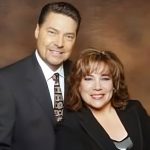 C&C Wealth Strategies is an income and wealth preservation firm that uses a systematic approach teamed with tax and legal advisors* to work toward customized results. Jim and Lorraine Conaway established Conaway & Conaway in 1996 to plan for better futures. C&C focuses on offering ROTH conversions, rollovers, pension maximization, income and portfolio analysis. Jim and Lorraine guide C&C by their moral obligations which suite to always put their clients’ financial lives in as the forefront of the business. Jim, Lorraine, the advisors, and the staff are continuously educating themselves on different ways to help clients work toward their financial goals. It is through a cognizant design of support and education where we establish lifelong relationships with clients and their families.
C&C Wealth Strategies is an income and wealth preservation firm that uses a systematic approach teamed with tax and legal advisors* to work toward customized results. Jim and Lorraine Conaway established Conaway & Conaway in 1996 to plan for better futures. C&C focuses on offering ROTH conversions, rollovers, pension maximization, income and portfolio analysis. Jim and Lorraine guide C&C by their moral obligations which suite to always put their clients’ financial lives in as the forefront of the business. Jim, Lorraine, the advisors, and the staff are continuously educating themselves on different ways to help clients work toward their financial goals. It is through a cognizant design of support and education where we establish lifelong relationships with clients and their families.
——————————————————
To listen to the EXTRA portion of this show go to RealEstateInvestingForWomenExtra.com
Learn how to create a consistent income stream by only working 5 hours a month the Blissful Investor Way.
Grab my FREE guide at http://www.BlissfulInvestor.com
Moneeka Sawyer is often described as one of the most blissful people you will ever meet. She has been investing in Real Estate for over 20 years, so has been through all the different cycles of the market. Still, she has turned $10,000 into over $5,000,000, working only 5-10 hours per MONTH with very little stress.
While building her multi-million dollar business, she has traveled to over 55 countries, dances every single day, supports causes that are important to her, and spends lots of time with her husband of over 20 years.
She is the international best-selling author of the multiple award-winning books “Choose Bliss: The Power and Practice of Joy and Contentment” and “Real Estate Investing for Women: Expert Conversations to Increase Wealth and Happiness the Blissful Way.”
Moneeka has been featured on stages including Carnegie Hall and Nasdaq, radio, podcasts such as Achieve Your Goals with Hal Elrod, and TV stations including ABC, CBS, FOX, and the CW, impacting over 150 million people.
Next-Level Income: How To Get Ahead With Your Real Estate Investment With Chris Larsen

Are you ready to take your investing to the next level? In this episode, Chris Larsen, founder of Next-Level Income and author of Next-Level Income, How to Make, Keep, and Grow Your Money Using the ‘Holy Grail of Real Estate’ to Achieve Financial Independence, talks about how you can capitalize on the real estate market. He shares what’s needed to know about investing and how you can get started on your journey. You’ll learn how to save money on taxes, invest in real estate, and make even more money faster than ever before. Tune in right now and learn what it takes to get ahead!
—
Watch the episode here
Listen to the podcast here
Next-Level Income: How To Get Ahead With Your Real Estate Investment With Chris Larsen
I am so excited to welcome back to the show my friend, Chris Larsen. Hi, Chris.
Moneeka, great to see you again. Happy New Year.
It’s the first show I’m doing in 2023, so I’m so delighted to have Chris here to start my year off with me. You have met Chris before. He talks about syndication. We’ve had a webinar with him before. I wanted to bring him back because his business has greatly expanded, and he’s offering some new things to help you create passive income. I wanted him to come back and talk about all this new exciting stuff. For those of you who have not yet heard of Chris, let me tell you a little bit about him.
Chris Larsen is the Founder and Managing Partner of Next-Level Income. Chris has been investing in and managing real estate for many years. While still at college, he bought his first rental property at age 21. I love that because that’s how I was. From there, Chris expanded into development, private lending, buying distressed debt, commercial offices, and ultimately syndicating multifamily properties. He began syndicating deals in 2016 and has been actively involved in over $1.5 billion in real estate acquisitions. Chris is passionate about helping investors become financially independent. I’m so excited to have you back, Chris.
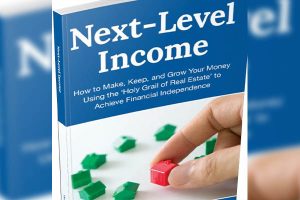
Next-Level Income, How to Make, Keep, and Grow Your Money Using the ‘Holy Grail of Real Estate’ to Achieve Financial Independence by Chris Larsen
Thank you so much. It’s great to see you. I love the smile.
In this episode, you’re going to be talking about the Next-Level framework. Chris used to be a coach. Much like me, other parts of his life are now creating changes for him. He’s creating a framework, and he’s going to tell you all about that. Give us a high level of your story.
One thing I love about you, Moneeka, is our stories are very similar in terms of starting with residential, and I was fortunate enough to be introduced to bigger commercial projects later on. My initial passion earlier in life was racing bicycles, and that’s all I wanted to do. I talk about this in my book, which, if you didn’t get it the first time I was on the show, you can get it on our website NextLevelIncome.com/Book. Let me know if you get a copy there that you read me on Moneeka’s show. I talk all about this. That was my love. That was my passion.
My best friend, I met through cycling. I went to college for Biomechanical Engineering, but I just wanted to graduate, turn pro, and race my bike. Along that path, my friend passed away, my best friend, my roommate, and my training partner. It affected me in multiple different ways when you lose somebody. In my case, he was like a brother. After it sunk in, it made me realize something. It made me realize that I didn’t want to have any regrets in life. I wanted to be able to live life to the fullest. I’m a very analytical person.
When I looked at that, I said, “How can you do this? How can you take advantage of opportunities?” The thing is, this is the truth. You have to have money in this world to be able to take advantage of opportunities. Sometimes, that’s spending more time with your family. Sometimes, it’s taking a business risk. Sometimes, it’s spending time to volunteer. Sometimes, it’s actually giving money. Dan Sullivan, who runs Strategic Coach that I was a part of for several years, likes to say, “If you can write a check for it, it’s not a problem.”
You have to have money in this world to be able to take advantage of opportunities. Share on XAfter my friend passed away, I quit cycling at the time and racing. I decided I was going to embark on a journey to become financially independent. I read book after book, over 250 books. I was investing in the stock market, but ultimately came upon real estate, as everybody’s figured out by now, I’m sure. After making a lot of mistakes over fifteen years, I ultimately started investing with other operators in commercial real estate, specifically multifamily. That was what gave me my path toward financial independence.
Now, I was making a lot of money. I was working as a medical device rep. It’s all different types of roles in sales in the medical device field. I was on call. I worked a lot of hours. I worked sixteen days. I worked seven months straight one time without a day off. I spent three days straight sleeping in the hospital. I worked really hard in my life, but I had a plan and a path. What I’ve done is I took the framework that I used that I was teaching my coaching clients one-on-one that would pay me $30,000 a year, and I put it into a course. I’m going to give everybody a high-level overview of what we teach in that course, a real CliffNotes version of what you can do to become financially independent in your own life.
I love that. That’s why you’re here. Chris is going to be giving us a high-level on this. We are going to do a deeper dive in a webinar on February 2nd, which is a Thursday. It will be our first webinar of the year with me. I’m so excited about that. Chris is going to be with me on that. It’s going to be Thursday, February 2nd from 1:00 to 2:30 PM Pacific Time. If you’re reading this later, there will be a replay. You can go to the same URL, which is going to be BlissfulInvestor.com/SixFiguresWebinar.
Preemptively, I wanted to tell you about that. As you’re reading this, if you’ve got questions, jot them down. He’s going to be live with us in a couple of weeks, so you could ask all sorts of questions then. Chris, go ahead and take it away. I just want to comment on the Make, Keep, Grow idea that I know you’re going to be introducing to my audience. I love that. It’s such a big piece of how I’ve structured my business, and how most real estate investors who reach a certain level of success start to look at things. Readers, I want you to understand that this is a little bit of an advanced concept, but it’s not only for advanced people. In other words, you can take these concepts right now, even if you’re a beginner, and build your entire business based on this concept of Make, Keep, Grow. Go ahead, Chris.
I have two young boys. I like to be able to teach concepts and talk about concepts that my boys can understand because I was explaining this to my son. We’re going to the bank, and I was depositing a very large check from a deal that I just sold. I explained to him how that large check started at $3,000. If you hear $100,000 or $1 billion in real estate transactions, and your eyes glaze over, or you’re like, “This isn’t for me,” I started with $3,000 for my first property.
These deals are still available nowadays. You can still find good deals. You can still find deals that are going to work for you. Whether you have $3,000 in the bank, $30,000, $300,000, or $3 million in the bank, all these concepts work. I know a lot of you that are reading are very successful. You’re making lots of money. A lot of you have careers that you love. I got to work with a lot of doctors and surgeons in my career, and I have a lot of investors from that. A lot of them say, “If I won the lottery, I would still go to work because I love what I do.”
If you’re a doctor and reading, God bless you because it has to be a passion that you really have to love what you do. It’s such a lifestyle. The first thing, and I talk about in the book and my course, is to find a way to make more money. The reason I say that is because a lot of the best investments out there are reserved for those that are accredited investors. That means you have to make $200,000 or more in annual income as an individual, $300,000 as a couple, or have a net worth of $1 million, excluding your personal residence.

Next Level Investing: A lot of the best investments out there are reserved for those that are accredited investors.
There are a couple of little nuances there that you may be able to get in. The bottom line is if you can make more money and you’re accredited, a couple of things happen. 1) You have more money and more capital to invest. 2) You have more opportunities because now you’re accredited. The SEC says, “You’re allowed to invest in some carwash opportunities or the new RV and boat storage opportunity that we just launched that not all investors who are out there get to have access to.” That’s the big thing.
I was successful and I was making money, but I wanted to be more efficient so I could have more time with my loved ones. One of the things we teach in the course is how to set goals, figure out what’s your worth, and delegate or get rid of those little distractions. One of my favorite things is how to create 20 to 40 hours more a week to spend with your family, do things that you love, or start a side hustle.
If you’re reading and saying, “Chris, I’m not at $200,000,” if you’re at $50,000 or $100,000 of annual income, if I could give you 20 or 40 hours more a week, could you make another $50,000 a year? Could you make another $100,000 a year? Could you maybe start a business that creates some passive income for you? Where we start is, “How do you become more efficient with your time, more effective with your time, and ultimately grow your income?” If you’re reading, and you’re making seven figures a year already and you say, “I’m good, Chris,” you can skip right through that section if you want to.
We start with making money. There are a lot of different ways that we can think about making money, too. The richest people in the world say they have an average of seven streams of income to make that money. I’ve said this on the show before. Because you have seven streams of income does not mean that you’re working seven jobs. It simply means that you have seven different streams coming to you from decisions that you have made. If you have a job that you love, that’s one stream of income. If you are investing in real estate, let’s say you have a portfolio of investment properties, that’s another stream of income.
I can talk to you a little bit right off the top of my head about what they are for me. I am a real estate investor. My rental properties make a particular stream of income. I have a bunch of notes that have brought me a stream of income. My husband invests quite a lot in stocks. That’s the part that he manages for our portfolio. I have a stream of income there. His income is a stream of income. My sponsorships from this show are a stream of income. Notice that I’m not fully involved.
You have a book.
I have a book. That’s a stream of income. The show I consider myself a media personality piece, which includes being an author and speaker, that is that stream of income. This is a secret, and I’m going to talk to you about this later, but I have also gone into high-return investments, which include Forex, crypto, and NFTs. All of that high-return stuff is also a piece of my income, and I’m getting a huge residual on that, too. That’s a very high risk, which is why I don’t normally talk about it because high risk also means high return. High risk, in this case, it’s the same thing, and things can crash and burn.
High risk also means high return. Things can crash and burn. Share on XAs I learn more and experience more, I’ll share that more with you, but that’s my secret adventure. We’ve got all of these different forms of income. Here’s the thing that takes the most time here. I work 5 to 10 hours a month on my rental property. There are other things, but mostly this. The media personality piece takes the most time.
That easily takes twenty hours a week because I’m traveling and other stuff like that. That’s my choice. I also spend time doing charity work. I also spend time on lots of other things. I’m a caretaker for my parent. Because I’ve got seven different ways that I’m making income, I’m not so concerned if one’s not working quite as well as the others. I have an idea monthly of what money is going to be coming in because I’ve diversified my streams of income.
You underscored what I was saying, Moneeka. It’s the same with me. I was always looking for ways. I know we’re going to deep dive into that in the webinar, which is how you evaluate these deals. I’ll give everyone in that webinar how you can figure out in five minutes whether it’s a good deal, and then really have not only a framework but also tools that you can use to say, “How do we figure out how to create these income streams?” Be confident while we’re doing it. I’m an analytical guy, so there’s a spreadsheet involved with that.
There is. I am involved in syndications also. In my real estate portfolio, I’ve got three of those paths of income. I’ve got a fourth because I run a construction company also. That’s more active. Even in the real estate arena, I’ve got several different paths of income that come in. If one of my rentals goes vacant, I’ve still got all my syndications paying quarterly, whatever they’re supposed to be paying. Even in my paths of income, I’ve subdivided. What I’m saying is that you don’t need to work harder to make more money, you need to work smarter.
What I really love about what Chris was talking about is if you can get 20 to 48 hours back a week, what would you do with that? Could you learn more about different ways to make that passive or residual income that you’re looking for to increase that income, so now you’ve got more opportunities, and you can invest in things that people that aren’t making that income can’t?
What happens is it snowballs. You create another income stream or you create more time in your life, and that opens up space. If you have that capital like we talked about before, and you have the time, now, you have the freedom to choose to work with and do the things that you’re really passionate about. That’s where I’ve found your income starts to multiply. We’re going to dive into this a little later. There are three silent killers who are insidious beasts that will come, and they’ll try to attack your income. The second component of the framework is how to keep your money.
I like to say, “Let’s put some more people in the boat and start rowing.” That’s make more money. What if your boat has a bunch of leaks? Working with dozens of coaching clients, some that are making seven figures a year, very successful, I found one thing in common, Moneeka. No one does all of these things properly. Those three things are proper insurance, proper liability protection, and proper tax strategy. What we talk about in the course is how to make sure you have all of these things in place. My father died when I was aged five. A death or major illness can rob you of income, especially if it’s a major source of your family’s income, as it was in my family.

Next Level Investing: No one does all of these things properly: proper insurance, proper liability protection, and proper tax strategy.
Number two, a lawsuit. You own these properties, and I know a lot of high-income earners and probably a lot of readers of the show. I was guilty of this early on as well. You own real estate, you own it in your own name, you don’t have a proper LLC set up, or you may be co-mingling funds. My attorney talks about a story where his friend lost $3 million because he didn’t take a few hours and $1,000 or so to set up a proper entity. These are things that can come and get you.
If you have liability in other areas of your life, you certainly don’t need more liability from our investments. My attorney provided all of his resources inside my course when he found out what we were doing. That comes inside of there. We even have a checklist. It’s the ultimate estate plan checklist. If it’s daunting as it was for me, you can go right through that checklist. You can say, “These are the steps I need to take,” everything from writing down where your passwords are, where your heirs or partner or spouse can find all the information for your properties, and accounts, and do those things to, “What about tax strategy?” This is low-hanging fruit.
Typically, my coaching clients are saving somewhere between 5% and 10% off of their taxes. What I mean is they’re paying 30% which drops to 20%. For most of our coaching clients, we can get them with the tax strategists that we work with. That’s not something that I do specifically, but I’m not an accountant, not a CPA. I don’t do that, but we have vetted CPAs that we work with, but they’re able to get most people’s tax rates, even W-2 income earners, a lot of time below 20%.
If you can save that money, that may be your first $50,000 for passive investment, for instance. That’s why I like to say it’s like a boat. If you can plug all the leaks in your boat, now you start rowing faster. When the money’s coming in, it’s not going out in the form of taxes, it’s not being lost. You can sleep at night because you’re not worried about losing it to one of these other things that are lurking in the shadows out there.
Savings is like a boat. If you can plug all the leaks in your boat, you can start rowing faster. Share on XI love that. We’ve talked about this before, and I know Chris has said this before. The more that you keep, the more it can compound. People will say, “It’s okay. I’ll deal with this later. I don’t make enough now, so I don’t need to worry about this.” The thing is that the sooner you get a handle on holding onto your money, the more that particular money will compound. Compounding is the magic of finance. The more that you can utilize that money to invest and grow it, the faster it will grow and the faster you get to that place of wealth. Keeping your money is very important.
I had a webinar and show about the Abundance Group Trust. Trust is another way that you can utilize to do these tax strategies, have your legacy things to pass down in case of death or health problems, but also how to mitigate your exposure to lawsuits because it gives you anonymity. I have chosen that route to go through trust. I know that Chris is introducing some other options.
That is a part and should be a part of most people’s estate planning.
Exactly. Chris, I’m going to send that show to you so you can listen to it because I’d love to hear your feedback on that. Readers, go back to that. It was on October 2022. It was Gina. I think you remember that. What I love also is that Chris gives you this checklist of all of these things because sometimes it can feel very daunting, which is why a lot of people don’t do it, but you miss a big opportunity. If you have to work less to get more money, that’s the golden grail. Let’s say you make $1,000 a year and pay 30% in taxes. Now, you’ve made $70,000. If you can cut that to 20% of taxes, you just made $10,000 more without working a single hour or minute more for that money.
Here’s the amazing thing, Moneeka. I’m going to pull my calculator out. If I was making $70,000 and I saved $10,000, I get a 14% raise, essentially. That’s a big difference. This isn’t tax fraud. You’re not evading taxes. You were literally taking the rule book of the IRS, and you’re following the rules that the IRS puts out there. I like the expression when it comes to taxes, “Be aggressive but document thoroughly.” If you have the right structure set up and you do that, that’s fantastic.

Next Level Investing: When it comes to taxes, be aggressive, but document thoroughly.
In the member’s section, I’m also talking about my million-dollar secret. This one secret will literally save you $1 million over your investing career. It’s incredible. If you look at these small numbers and these small amounts that seem small, through compounding and the difference when you go up in terms of how much you can save and keep versus giveaway to the government or other people, these are seven-figure secrets that you’re learning.
It does take some time upfront to do some research and find out what the right structures are for you, what it is you’re trying to achieve, what your assets are, what are your obligations to the family later on, the upside or the downside, my parents versus maybe children, or my nephew or whatever, where you are feeling your obligations are going to be, how you want that legacy to be transferred, and those sorts of things. It does take a little bit of thought. I understand that it can be daunting, but it’s a very important piece of the financial picture.
Don’t just assume that you just have to work harder to make more money. You don’t. You can work a little bit more for a little while, but it’s not a twenty-year commitment. So much of the time, you ask for a raise from your job. Are you going to get 14%? When you get that raise, often, you’re going to have more responsibilities. You’re going to have to work harder, more hours.
Pay more taxes.
My husband will move to another job. Now, he’s got two years in raise like, “I got to prove myself,” to make that extra 5% increase and income that he made. It’s not necessarily what I’m suggesting. It’s a path. That’s great. My husband loves his job, but you can make more income without doing all of those other things.
That’s what we’re trying to do. They’re not secrets. With all this information, I’ll give you all the resources and the path to do it. We do it in about 30 minutes a week. It’s 8 modules, 30 minutes a week. You can knock this thing out. You can do it on a weekend for sure. You can go through it 30 minutes a week for 8 weeks. You’d be done it in two months.
We talked about the make and keep. Let’s talk about the really fun one, grow.
Grow, it’s sexy. This is investing, and we’re talking about it with our friends at our Christmas or holiday parties and cocktail parties and those sorts of things. I’m glad that we started with the other pieces because have you made time for what matters in your life? Have you plugged the holes in your boat? Do you have just an ironclad plan so that you know you’re safe? You can sleep well at night. You don’t have to worry that after you’ve made this money, it’s just going to get sucked away by one of these little silent killers that are lurking out there, or not so silent. If you’re about to get your tax bill, it’s pretty loud when you got to write that check.
You then get to the growth part. We’re going to dive deep into the webinar about how to evaluate passive deals and syndications. Before you do that, there are a lot of active investors I know that are reading. I started as an active investor. I’m still active in investments, but I also have passive investments in about 40 different passive investments. We talked about how to decide, “Do you want to be active or passive in terms of your real estate portfolio?”
Maybe you’re like your husband, Moneeka, and you say, “I love what I do. I make great money.” I would like to know how to be confident in finding passive deals or marry a wonderful person like yourself, and that you handle some of that stuff. That’s a fantastic way. We also give you the tools to figure out when you will become financially independent. We have a beautiful spreadsheet that’s part of this, and it’s going to allow you to plug in your numbers at the end to figure out when you can be financially independent.
This isn’t some magic bullet. I’m not going to wave a wand. I’m not going to make you some promise. If you’re accredited and making a good income, I find that pretty much everybody has a path to become financially independent in about seven years. It can be a little bit less or more than that, depending on where you are in your journey, but I find that to be a very realistic number if you’re out there, and you have a family like I do like most of you do that are reading, going to do that.
The first step is active or passive, then you have to decide, “If I’m going to be active, what strategy am I going to do? Am I going to do fix-and-flips? Am I going to do notes? Am I going to manage my own rental portfolio? Am I going to do short-term rentals?” My wife and I have two short-term rentals here in Asheville, North Carolina. We participate a little bit active, but it works very well because we also have places for our family and friends because people like to come to Asheville, North Carolina, so it works well with us.
We decided we didn’t want to do more short-term rentals. We would rather do stuff that is more scalable. We go through what your right strategy is. A little active, a little passive, maybe none of one, and 100% of the other. Maybe you decide you want to go full-time into real estate, and that’s great. However, even if you say, “I’m going to be full-time in real estate,” that’s not scalable. I talk about everyone should have a strategy for passive income. Once you got those big flywheels turning and all that excess cash that you’re kicking off, where are you going to put it? What type of deals are you going to put it in?
More specifically, what is the framework, both qualitative and quantitative, that you can evaluate those deals so that you can be confident that you’re putting your money in the right place? It can be daunting when you look at something like a $50 million or $100 million apartment complex that you’re investing $50,000 in. Is that just like a house? It’s not just like a house. There are a lot of other different factors. It’s more complicated in some ways. It also can be simpler in some ways. We break down all of those qualitative issues, the right questions to ask, and the data.
If you’re a data person like me, we have stuff that you can go through to learn, “What are the right questions? What is the local population growth?” We talk about sponsorship fees, and you can dive deep into all those different areas. You can go to the high level and figure out, “These are the questions I need to ask. These are the deals that I’m going to be in. This is how much cashflow it’s going to kick off,” and then you can calculate your freedom number. We call it your path to financial independence.
I love that it talks about qualitative as well as quantitative. You have read at least easily 25 syndicators on this show. These are all people that have become fairly good friends of mine. Not all of them, but several of them. Even though I’m close to them and trust them, I get overwhelmed looking at their deals. There’s the piece where how you build trust. I’m very lucky because I have this show, so I get access to a lot of these people. These come across my desk all the time.
For those of you that are not in my situation or a much simpler situation than me, you need to find ways to find the syndicators that you’re going to trust. Hopefully, you’ll investigate the people that I have had on my show, but there’s also really good stuff that you can do on the internet to look up people. That’s qualitative, who are you going to invest with? The quantitative is, what are you going to invest it with? Both of those pieces are really important, and they’re both big pieces of the puzzle. Please go ahead, Chris.
The qualitative comes down to what are the right questions to ask. Anxiety comes from fear of the unknown, and how can we know if we don’t know the right questions to ask? We give you the right questions to ask, so you can have a measure when you talk to other syndicators who know that, just like anybody that goes in, whether it’s a car mechanic or a doctor. A lot of people are overwhelmed when they go to the doctor because they don’t know what questions to ask, especially if there’s an illness or something, and they’re in a very emotional state.
I remember my mom when she had cancer. They’d sit down and record the conversations, but my parents didn’t know what questions to ask because they weren’t medical professionals. They would come out of there, and a lot of times, they were even more confused than when they went in. If you’re confused and are not comfortable, you definitely should not invest. If you don’t feel good about something, don’t invest. If you have the right questions and the right knowledge, if you then say, “I’m confident,” that’s what we want to do. I want to give you confidence, and then you can say, “I’m on the right path.”
That’s why we want to put it also in that quantitative portion, so you can have a score, you can have numbers, and say, “I’m moving towards this.” I tell you what, you make that first investment, you get a check for a few $100, or $500, or $1,000, it’s cool, but that’s not going to move the needle enough. When you can see, “It’s going to start with a few hundred dollars this month,” and then a couple more months down the road, that’s going to grow, and then a deal sells. We were talking about when we started this show. We’re going to the bank with my son, that $3,000 is now hundreds of times larger than that.
That allows me to go and reinvest that money. It takes time, but I knew it would come over time because I knew I could look at my spreadsheet with a degree of confidence, I can go and say, “Now, I know what I can do with that for the future.” That’s what this is all about. Real estate is a get-rich slow game, and we want to give you the framework and the roadmap, which is why we call it the 6 Figures of Passive Income Roadmap, to get you where you want to be, which is on that path to ultimate freedom.
It keeps you focused. So much of the time when you’re in it, you need that focus. I was on a twenty-year plan on how I was going to retire. Every once in a while, I had to remind myself, “Why am I doing this?” You have something that came up with a rental property that made me crazy, “Why am I doing this?” Spreadsheets and numbers really help keep you very focused on why you’re doing what you’re doing and where you’re headed, and why this is a good idea.
“Honey, why are you talking to the real estate agent on our honeymoon?” “This is why, because twenty years from now, sweetheart, we’re going to be financially independent.” True story. Fortunately, it didn’t take twenty more years, but on our honeymoon, I was trying to figure out how to get a place rented out. It was a mess. I will never forget that.
I’m so with you on that. I want to go into our EXTRA portion. Here are a couple of things I want to close the show with. First of all, we are going to be talking in EXTRA all about a deep dive more into the three secret killers of wealth, which are death, health, lawsuits, and taxes. That sounds like four, but I think death and health are the same.
We’re going to be doing more of a deep dive on that in EXTRA because I really want you guys to start thinking about that stuff. They’re not fun and happy and sexy things, but very real. There are things as you’re building your wealth that you need to think about, take into consideration and plan for. We don’t have a lot of people that are talking about that. I trust Chris to give us a lot of really good information. I asked him to do that for us in EXTRA. We’re going to be talking about that there.
If you are really excited about Chris’s course already, and I would be if I were you, you can go get it right now at BlissfulInvestor.com/EvaluationCourse. I know those are long words. I’m sorry. I was trying to think of what I could make this, but it’s the best description that we can get. Here’s the thing. It just released. It’s brand new on the market. He normally charges $1,497 for it, but my audience gets 30% off. Go to that link, and then put in the code BLISS, all in caps, and you get a 30% discount, which is huge. That takes that down to about $1,000.
Yes, it’s right about $1,000.
If you want more information before you invest in the course or if you just want to talk about syndications and ask Chris more questions, because as you can see, he’s an open book, he’s very transparent and loves to talk about this stuff, we are going to be having a webinar. Mark your calendars, Thursday, February 2nd, 2023 from 1:00 to 2:30 PM Pacific Time. For those of you that are reading this later, you can still go to that URL and re-read. The URL to go to sign up or re-read is BlissfulInvestor.com/SixFiguresWebinar. Those of you that can join us, please come and ask lots of questions. I’d love to see you there. I’d love to say Happy New Year.
Happy Groundhog Day on the 2nd, I just noticed.
Is it? We’re going to be celebrating lots of things. Put that all on your calendar and mark down those URLs. Did you want to close with anything, Chris, before we say goodbye and move into EXTRA?
Thank you so much. It’s always good to talk to you here. When we do that course, come ask me anything. As Moneeka said, I’m an open book. Unfortunately, I made a lot of mistakes in my life. I’ve had some unfortunate incidents like losing my father and my friend. I’ve been through these things. Hopefully, I can help you with some of the tools that I’ve put together and the lessons that I’ve learned, so you don’t have to make the same mistakes that I did.
I love that. Thank you. Always remember. Goals without action are just dreams. Get out there, take action, and create the life your heart deeply desires. I’ll see you soon.
Important Links
- NextLevelIncome.com/Book
- Strategic Coach
- BlissfulInvestor.com/SixFiguresWebinar
- Gina Gaudio-Grace – Previous Episode
- BlissfulInvestor.com/EvaluationCourse
——————————————————
To listen to the EXTRA portion of this show go to RealEstateInvestingForWomenExtra.com
Learn how to create a consistent income stream by only working 5 hours a month the Blissful Investor Way.
Grab my FREE guide at http://www.BlissfulInvestor.com
Moneeka Sawyer is often described as one of the most blissful people you will ever meet. She has been investing in Real Estate for over 20 years, so has been through all the different cycles of the market. Still, she has turned $10,000 into over $5,000,000, working only 5-10 hours per MONTH with very little stress.
While building her multi-million dollar business, she has traveled to over 55 countries, dances every single day, supports causes that are important to her, and spends lots of time with her husband of over 20 years.
She is the international best-selling author of the multiple award-winning books “Choose Bliss: The Power and Practice of Joy and Contentment” and “Real Estate Investing for Women: Expert Conversations to Increase Wealth and Happiness the Blissful Way.”
Moneeka has been featured on stages including Carnegie Hall and Nasdaq, radio, podcasts such as Achieve Your Goals with Hal Elrod, and TV stations including ABC, CBS, FOX, and the CW, impacting over 150 million people.
Smart Tax Strategies for Real Estate Investors with Amanda Han – Real Estate Women
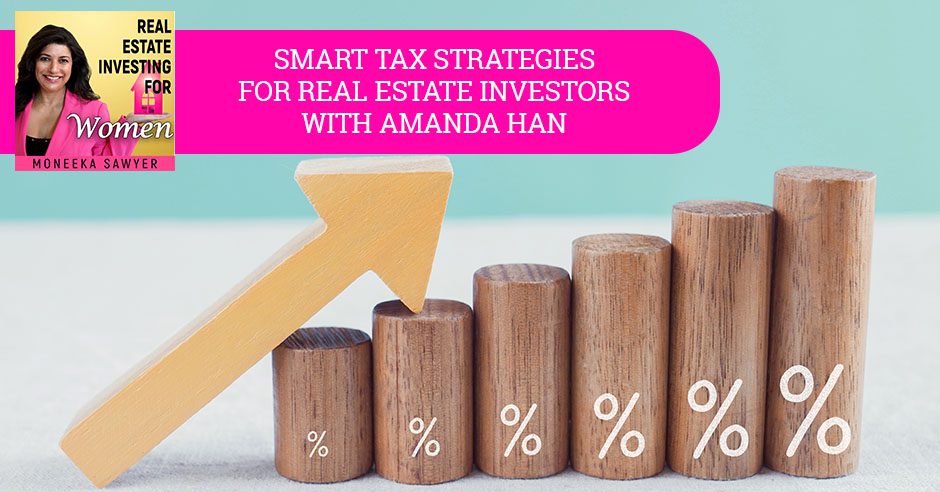
How can you recharge your wealth and scale your real estate business? Today’s guest has the smart tax strategies for you! Amanda Han has all the background she needs for real estate. Even though her family is pursuing businesses in the real estate industry, she decided to take the traditional route of studying, graduating, and landing a job. She became a CPA which helped her more in the real estate business, where she could focus on expenses and taxes. That knowledge led to successful real estate investments. In this episode, Amanda details what you could write off, especially for your taxes, to gain more savings instead of expenses.
—
Watch the episode here
Listen to the podcast here
Smart Tax Strategies for Real Estate Investors with Amanda Han – Real Estate Women
Real Estate Investing For Women
I am excited to welcome back to the show Amanda Han. Both a tax strategist and real estate investor, she helps investors with strategies designed to supercharge their wealth-building using entity structuring, self-directed IRA investing, and income offset opportunities to keep more of what they make. Amanda has a highly rated book, Tax Strategies For The Savvy Real Estate Investor, on Amazon and has been featured in prominent publications including Money Magazine, Talks at Google, CNBC’s Smart Money Talk Radio, as well as BiggerPockets podcast. Amanda, how are you?
I’m doing good. I’m excited to be back.
Thank you so much for offering to be on the show. You are always full of amazing information. I appreciate your time.
I’m excited to be back and talk about everything taxes.
You have been on the show once before, so everybody knows you. Why don’t you give us a high level of how you got into this story?
I am the third generation of real estate investors in my family. My grandparents first immigrated to the USA and invested in real estate. My parents also invested in real estate, although not full-time. My husband and I decided to invest in real estate after several years of working in a large firm in public accounting, where we helped real estate investors with their taxes. It wasn’t until I read Robert Kiyosaki’s Rich Dad Poor Dad book that I realized that’s something that I should do. My job at the time was to help real estate investors save taxes. For some reason, it never dawned on me that that was something I should be doing for myself until I read Robert’s book. That’s how we got started.
It’s fascinating because I’m a legacy investor also. My parents were immigrants and started investing in real estate. Think about that. All these immigrants are coming to the United States, and they have heard from someone else in the world that the way to build wealth in the United States is by real estate. They usually don’t have those opportunities in their own countries. They come here, buy real estate, build wealth, and do amazing things for their families, yet here in America, we’re sometimes a little bit complacent simply because we don’t know how valuable the opportunities are. We take them for granted.
It sounds like Amanda had the same experience as me like, “That was fine for you, but I don’t necessarily want to do that.” We don’t get the value of the opportunities that we have here. My dad was like, “You should get into real estate not as an agent but as an investor.” I was like, “I don’t want to do that. It’s too stressful.” It was funny that you had to get advice outside of your family.
In Robert’s book, he talks about rich dad and poor dad. Those are two different people for him. For me, it was the same because my parents and grandparents, although they did real estate, they always taught me the traditional route, which is, “Get good grades, get to a good college, get a good job.” When I got into one of the largest public accounting firms, it was like, “That’s it. I made it. I have already attained my life’s goal.” They didn’t talk to me or push me in the direction of being a real estate investor. I had to get that from someone else telling me that and then, “Maybe that’s what I should do.”
Investors are always really good about writing off things that are specific to their properties.
I had both from my parents too. They were like, “You have to go to school, get good grades, go to a good university, get a good job.” They also said, “You should be investing in real estate.” My dad had me managing some of his properties, which stressed me out so much as a kid. I was like, “I don’t want to be doing all this stuff,” but he was trying to help. We have that experience as immigrants. For our ladies who are reading this, know that these opportunities are amazing here in America. We don’t get those in other countries. I’m proud of you for tuning in to this show, but we need to take action. Taking advantage of those opportunities is the only thing that’s going to grow your life. I love that story.
When I was growing up, we lived close to my grandparents, and it was the same feeling as real estate. It wasn’t glorious to be a real estate investor. It was more of a hassle because we did our own work during tenant turnovers. I remember I was really young when my grandparents would take my cousin and me out to the properties. When people moved out, we would be there cleaning up and painting. It’s not like, “This is such a cool thing.” It’s something we didn’t want to do, but it’s different for investors now, you don’t have to be doing that stuff.
It’s not glamorous work. People meet me and they are like, “How did you do what you do?” They all think it’s glamorous. This is not glamorous. First of all, it’s the most intuitive thing on the planet. Buying a home and either living in it or letting someone else live in it is the most intuitive business. We all need housing. I do still manage my property. I’m not into painting but I’m hiring somebody. I’m still vetting out my people. It’s not glamorous. What is glamorous is the levels of money that I made and the wealth that I built working for a few hours. Even though I might be there 4, 5 or 10 hours during a turnover, what do I get for that?
I love this conversation because this is important for us to point out. Every job has its glamour factor and the grunge work that has to happen as a tax consultant. Amanda is this beautiful woman with a beautiful voice. She’s running this company. She’s wealthy. She invests in real estate. She’s very successful. There’s a level of glamour around that. She’s still the one that’s punching numbers. That is the non-glamorous piece. Everything that we do in the world is going to have like, “This is awesome,” and “This is the thing that we have to do to make it happen.” Keep that in mind as you think about all these things you would have to do in real estate. First of all, you don’t have to do all those things but no matter what you’re doing, you have to do both sides.

Tax Strategies: Getting into one of the largest public accounting firms is an attainment of a life’s goal.
You still wash dishes together, clean the floors, and wipe your babies’ butt when they poop. You do all of those things. There’s the beauty, glamor, romance, and the living life piece. That’s true for everything that we do. Sorry to belabor this but I feel like some ladies need to know it. They want to do the things that are cool but they don’t understand. Not just ladies, this is for everybody. As you are learning something new, you have to do those other things to make the glamorous end result you are looking for. It doesn’t have to be painful, unhappy or any of that, but it’s part of the course. You’re going to need to do things that don’t feel glamorous.
As it relates to the tax side of things, not for me as a CPA but just for investors, a lot of times, people who either hear me speak on a platform like this or read one of our books will say, “I love hearing the stories about how people saved $10,000 or $50,000 in taxes. I want to do that. Does it happen automatically? I read the book, and now I’m going to expect that to happen.” It doesn’t happen that way. The story is the glamour of this is what happened, but what you’re not seeing or paying attention to is what did that investor do during the year so that by next April, when they’re meeting with their tax person, they have everything in place so they can get the tax savings.
Let’s talk about investing and taxes. What can you write off as an investor? Give us some ideas.
When it comes to write-offs, the IRS sees investors as business owners. By business owners, I don’t mean you have to go out and get an LLC, a corporation or anything like that. I mean that you are in the business of investing in real estate. Whether you are a landlord who’s getting rental income, you are in the real estate business. If you are a flipper, wholesaler or even a realtor and you are making money in those activities, you are in the real estate business. You hear people talk about things when they say, “Business owners get all these incentives, loopholes and benefits,” but the vast majority of those write-offs are also available to us as real estate investors because we are business owners. Investors are always good about writing off things that are specific to their properties.
Let’s say you’re a landlord, most people don’t forget to write off their mortgage interest. There’s a lot of money they are paying into the bank, so they are not going to forget that or property taxes you paid to the county, maybe even paying your property manager to manage properties or repairs. People are usually pretty good about those expenses and not missing out on them. What I find that a lot of people miss out on is what we consider overhead expenses. These are expenses you are spending for your real estate business that are not necessarily specific to a property.
Maybe you bought a membership to be in a club or a group like a women’s group or something, or a tax book to learn how to invest in real estate and save taxes. You are driving your car for real estate purposes. Most of us probably use our cell phones, laptops, and all that for real estate. Even though these are things that are not specific to any property, they are for your real estate business as a whole. It’s important to make sure that as an investor, we are tracking and writing off those expenses. We’re all in agreement that tax rates are not going down. If anything, they will stay the same but possibly go up.
As those tax rates go up and you have $100 worth of expenses and save $20 or $30 in taxes, that’s pretty significant. $100 might not seem like a lot but if you are tracking all those throughout the year, then you are talking maybe a couple of thousand dollars or tens of thousands of dollars. That’s when the savings could be significant that you might save enough money for a down payment on another rental property next year.
I love that last piece where you said, “What if instead of paying taxes, we were buying another rental property?” Understand that Amanda and I are not advocating and doing anything that is not legal, but these are things that are legally accessible by us if we pay attention and prep a little bit. It’s never been positioned that way where you could take the money you are not paying in taxes, get a refund or however that shows up, and then turn it into another rental property and opportunity for cashflow.
Let’s say it was $10,000 we paid in taxes. We know what the return on investment is. It is $0.
We got nothing. We get the stuff that the government gives us but we don’t have it personally.
It’s not a surprise that, as real estate investors, we can save on taxes.
If you instead had $10,000 more to invest as a down payment, that could be $50,000 worth of real estate. That could be small property or at least a part of a property. If you do that year after year, they could supercharge how quickly we build our portfolio. A lot of real estate investors I meet oftentimes will say, “I want to get into real estate but I don’t have money to invest. How do we get bank financing? How do I get investors’ money? How do I partner with other people?” Although those are all great ideas and things we need to use as an investor, why not look in our own pockets first? It’s like, “This is the money I’m making. If I can keep more of my earnings, then I already have more money to invest. I don’t have to worry so much as to where am I going to find the money for my next deal.”
Especially for a down payment, you can use that money to invest in another deal. You could also use that money to do a partial or a down payment for several properties or one property in a nicer area. You can make different choices about the business you want to run.
People don’t look at it that way. They are like, “I don’t want to pay the IRS. I’m going to save money.” I have met people who are like, “I got a big refund, now I’m going to go on vacation with that. I’m going to buy something personal.” That’s not the goal. If you save the money and use it to invest in real estate, that new property will give you more write-offs for next year. It’s a compounding effect of saving and investing more so that you can save more and invest more.
Along the way, you are going to be enjoying that cashflow which would be supplementing, and you can partially reinvest that into your business. You deserved that vacation but it is a mindset switch. Amanda and I had the pleasure of meeting in San Diego. We had a boss lady weekend. I met with all these amazing women that are investors in real estate or some iteration. They do something around the real estate investor thing. It was funny because we all carried nice purses. I’m not a purse person, but we had our nice clothes or purses.
We all drive nice cars and have nice homes. Amanda talked about the tents that her kids built right in their cute bedrooms. We have got nice lives. We had met another woman and she was a friend of ours. She had bought a $50,000 ring. That’s certainly her right. If that’s what lights her up and she loves that, that’s awesome. All of us had the reaction of, “That’s another house.”
I love jewelry. My husband bought me another $6,000 ring for our 25th wedding anniversary, but that’s a house. It is a mindset of you should enjoy your life and have things that you love and make you happy, but understand that it’s balancing between our businesses and those things that we think are going to make us happy. We do need our vacations. I’m a choose-bliss person. A big part of bliss is about loving the journey and vacation is a big piece of that, but you should balance that. Use some of that money for investing. If it’s tax-saving money, that is business money. Business money should be reinvested. You can decide.

Tax Strategies: $100 dollars might not seem like a lot, but if you are tracking all those throughout the year, then you’re talking maybe a couple thousand dollars or tens of thousands of dollars.
It’s making that conscious decision and being honest with yourself in terms of what you are doing. Sometimes I’ll meet people who say, “I want to get into real estate investing. I hear all these great things about cashflow, appreciation, and tax savings.” By the next time I see them, they are like, “I was looking at real estate, and then I bought this nice big home for myself. I decide to upgrade. This is like an investment.” It’s being honest with yourself in that, “I didn’t end up buying an investment property. I ended up buying something nice for myself and my family.”
There’s nothing wrong with that, but understanding that the nice large home that you bought is not giving you cashflow. It’s not giving you an additional tax write-off because it’s not a business. It is by understanding the differences between every financial decision you are making, whether that’s more for personal enjoyment or true investment and growing your portfolio.
Do you need an LLC in order to save on taxes?
It piggybacks off of your first question, “What can you write off?” A lot of investors are under the assumption that in order to write-off anything, you have to have an LLC or you have to pay for it from your LLC. That’s not true at all. What I was saying is as real estate investors, we are business owners in the eyes of the IRS. The definition of business is not LLC, S corp, C corp or any of that. It’s whether you are investing in real estate. We have a lot of investors who are landlords who don’t have LLCs. For one reason or another, they choose the whole rentals in their own name, in the trust or something like that.
They can still write off all those same expenses we talked about, a car, home office, cellphone and travel. All those things are tax-deductible. It’s a common myth that people feel like, “I don’t have an LLC yet. Let me go ahead and form an LLC so I can take these deductions,” when more than 90% of the time, those normal expenses can be deducted regardless of whether you have an LLC or if you operate in your personal name. When it comes to taxes, we break it out into two different groups like if you have rental income. That will be rental from single-family, multifamily, commercial, all types of rental income versus the other bucket, which is more active income. Active income will be if you are a realtor, a wholesaler or a fix and flipper.
The reason we have those two different buckets is because taxes are treated differently for those two different types of income. For most landlords with rental income, it doesn’t matter from the tax side whether you have an LLC or not because you don’t pay self-employment taxes. You can write off the same things. For landlords, the reasons for having an LLC would not be for tax. It’s mostly for asset protection purposes. Your attorney might say, “You don’t want to lose all your assets because one of your tenants sue. Let’s put that in an LLC or a partnership to get the liability protection.”
On the other hand, for active income flipping wholesaling, you also have to pay self-employment taxes. Not only do you pay federal and state income taxes, but you are also paying into Social Security and Medicare. That’s another up to 15% tax. That’s where having an LLC or S corporation could help minimize those. It’s difficult to say if you should have an LLC or not, and that investment number two should have one. That’s all based on your unique situation. How much money do you make in real estate? How much other income do you have from a job or a business? That’s something that you want to plan out with your tax person.
For someone who has active income, let’s say you have $100,000 of taxable profit from flipping, wholesaling or as a realtor, if you run it through an S corporation or something similar, you might save up to $7,000 in taxes with the structuring. That’s where it typically makes sense to have an entity. In either situation, you can always write off the same things regardless of whether you have an entity or not.
I loved the clarity on the two different ways that work and how the IRS looks at that. What would you say are the biggest mistakes that real estate investors make when it comes to taxes?
There were quite a few of them. We are talking about entity structuring. There are two big mistakes on the entity structuring side. One is using entity structuring almost as an excuse to delay investing. This is more for newer investors because I do hear this quite a bit like, “I’m going to invest in something,” and then a couple of months later, they will tell me, “I have not invested yet. I could not decide on a name for my LLC.” That’s an excuse to say, “I didn’t do it because I don’t have an LLC yet.” One way to overcome that is to understand you don’t have to have an LLC to buy rental properties. Even if you bought a property now, you can always move the title into an LLC after the fact. We don’t have to worry about that. For a lot of the women investors, it is more of we have to find that perfect name like Blissful Real Estate, LLC.
People get caught up in all that instead of focusing on taking action and doing real estate. The other most common mistake on the entity side is forming the wrong type of entity. That’s one of those things that if you form the wrong entity to hold your real estate and don’t find out until way later that you were in the wrong entity, it becomes very costly to unwind that.
We have seen clients who had owned real estate inside of S corporations for 5 to 10 years. It’s very difficult for them to unwind it because now the property has appreciated. The only way to unwind it is to pay a lot of tax to get it out of the entity’s name into the correct entity. There’s a fine line between not waiting too long to form it, but then also forming it correctly from the start, so you don’t have such costly ways to unwind that structure.
That to me seems a little scary when you think about, “I have to unwind if I screw up.”
Sometimes, you can’t do it. There’s no real way to do it where you don’t have to have taxes. Entity formation is not like a do-it-yourself like, “I was on this podcast. I read this book,” and then you go ahead and do it. It’s something that you want to sit down with your tax advisor and talk through. Some of the questions to answer are not just, where am I buying a property? It’s also, how much is the equity in my property? What’s my exit strategy. Am I just selling it like flipping? Am I going to hold it for 5 or 10 years? What other income am I getting from this property? Is it a long-term rental or short-term? If it’s a larger property, am I also going to have vending machines or a washer and dryer? All these things help determine what type of entity you are going to hold your real estate in. By having that conversation upfront, it helps them minimize the risk of getting into the wrong type of legal entity, to begin with.
The other question we were going to talk about was can we buy rental properties in retirement? The answer is yes. Ladies, you have heard other people talking about self-directed and stuff like that. One of the things that I want to talk to Amanda about is, what are the logistics around that? We got a pretty good high level on the fact that it’s possible and what that looks like, but I asked Amanda to do a breakdown on what that looks like. Amanda, let’s do that in EXTRA.
I have a little different spin for the custodians when they talk about what you can and cannot do. My job is on the step before that, where the investors are figuring out, what type of account is best for you? How do we use that and invest in real estate, and how do we save taxes with the money going in? There are lots to share on that part.
We will do that on EXTRA. We’ll be talking about investing in real estate through retirement funds and from a tax perspective. Before we go into our three rapid-fire questions, let’s talk a little bit about some of the things that you are offering my audience. You do have a free eBook.
We have an eBook. It’s called Tax Strategies For Real Estate Investors. You can find it on our website at KeyStoneCPA.com. It goes a little bit more in-depth in terms of a lot of the things we talked about. We talked about maximizing write-offs and how to take a tax deduction by shifting income to your kids. If you have kids or elderly parents helping you in your business, how do you do that? We talked about entity structuring. In our book, we break down some of the questions and what you should be considering before you meet with your tax person, how to use legal entity structuring correctly, and a lot more stuff. Check it out on our website.
You also have a mini-course for real estate investors specifically. Could you tell us a little bit about that?
It’s an on-demand course for beginner investors. It’s delivered in the course of four days. You can get the content when you have time. We talked about the power of tax savings like how you use tax savings to supercharge your wealth building. We go over the top ten most common tax strategies for all types of real estate investors. We talk about the six-step process like, how do you have an effective tax plan?
Know the main things that you need from the property. If they meet your criteria, then go after it.
It’s not a surprise that as real estate investors, we can save on taxes, but the question is always, “How? What are the things I need to do so that I’m ready for next April?” We also have a risk assessment as part of our on-demand course. Those are a set of questions to help you try to figure out if you are overpaying in taxes. That’s a question we get a lot, “How do I know? Do you think I’m overpaying in taxes?” I don’t know because I don’t know the answers to some of these questions but hopefully, you will, by taking this assessment yourself.
All of that goodness is only $39. Go get that. It’s good stuff. You have to go to BlissfulInvestor.com/AmandaTax. I know that will be helpful. Amanda covers a lot of very good stuff for real estate investors, specifically because she is an investor herself, so she knows what we go through. Amanda, are you ready for three rapid-fire questions?
I think so.
Tell us one super tip on getting started investing in real estate.
I’m a numbers person. The way I look at it is to look at the numbers. If the numbers make sense, then pull the trigger. Don’t overthink it, don’t delay and don’t overanalyze it. Know the main things that you need from the property. If they meet my criteria, then go after it.
What is one strategy for being successful as a real estate investor?
We work with new and advanced investors. One thing that I see across some of my more advanced real estate investor clients is they treat real estate investing as a business. I don’t mean LLCs or set up an LLC. They run it like a business in terms of they have the right teams in place to do the things that they’re not good at. If they are not a good bookkeeper, they have a bookkeeper in place. If they are not good at managing real estate, they have property managers in place. It’s by running that as a business and creating systems around everything you do as you scale your real estate. You don’t have to recreate the wheel every time. Those are the things I see with most successful real estate investors.

Tax Strategies: Treat real estate investing as a business.
I have frequently said that systems equal bliss because they give you freedom. A big piece of being blissful is having the freedom to choose what you do with your time. Systems and teams are key to that. Tell us the personal practice that you do daily that contributes to your success.
It’s not a system. It’s more of a habit. My habit is I don’t have a to-do list. My thing is if I have something that I know I need to do that is important to me, I add it to my calendar directly so that time is blocked off. When the time comes, that’s when I do it. I try to organize and prioritize the things I have to do, but it’s not in the list format. It’s more like, “Get it on the calendar so that it’s done.” I’m a big proponent of that because before, I had a to-do list. They kept getting longer. It’s more to-dos and more to-dos until you don’t have time to look at the to-do list anymore.
Nobody has ever said it that way before. We thank you so much for all that you have offered on this portion of the show. It was awesome.
I’m excited to be here. I’m happy to come back anytime.
—
Ladies, we do have more on EXTRA. We are going to be talking from a tax perspective all about investing in real estate through your retirement funds. That’s going to be an interesting topic. If you are subscribed to EXTRA, stay tuned. If you are not but would like to be, this may be the time to do it. Go to RealEstateInvestingForWomenExtra.com, and you will get the first seven days for free. Thank you so much for joining Amanda and me for this portion of the show. I look forward to seeing you next time. Remember, goals without action are just dreams. Get out there, take action and create the life your heart deeply desires. I’ll see you soon.
Important Links
- Tax Strategies For The Savvy Real Estate Investor
- Tax Saving Strategies for Real Estate Investors with Amanda Han – Past Episode
- Rich Dad Poor Dad
- KeyStoneCPA.com
- RealEstateInvestingForWomenExtra.com
- [email protected]
- BlissfulInvestor.com/AmandaTax
About Amanda Han
 Amanda received her accounting degree from UNLV. As a CPA and real estate investor, Amanda has helped countless investors across the nation to supercharge their wealth building through proactive tax saving with her top-selling Amazon books as well as her teachings on prominent publications such as Money Magazine, Google Talks, and CNBC.
Amanda received her accounting degree from UNLV. As a CPA and real estate investor, Amanda has helped countless investors across the nation to supercharge their wealth building through proactive tax saving with her top-selling Amazon books as well as her teachings on prominent publications such as Money Magazine, Google Talks, and CNBC.
Amanda brings over two decades of tax planning and compliance experience from working in Big 4 Public Accounting as well as public and private companies. In her spare time, Amanda enjoys canvas painting, biking by the beach, and seeking out the best hole-in-the-wall dining options where ever she visits.
______________________________________
To listen to the EXTRA portion of this show go to RealEstateInvestingForWomenExtra.com
To see this program in video:
Search on Roku for Real Estate Investing 4 Women or go to this link: https://blissfulinvestor.com/biroku
On YouTube go to Real Estate Investing for Women
Moneeka Sawyer is often described as one of the most blissful people you will ever meet. She has been investing in Real Estate for over 20 years, so has been through all the different cycles of the market. Still, she has turned $10,000 into over $5,000,000, working only 5-10 hours per MONTH with very little stress.
While building her multi-million dollar business, she has traveled to over 55 countries, dances every single day, supports causes that are important to her, and spends lots of time with her husband of over 20 years.
She is the international best-selling author of the multiple award-winning books “Choose Bliss: The Power and Practice of Joy and Contentment” and “Real Estate Investing for Women: Expert Conversations to Increase Wealth and Happiness the Blissful Way.”
Moneeka has been featured on stages including Carnegie Hall and Nasdaq, radio, podcasts such as Achieve Your Goals with Hal Elrod, and TV stations including ABC, CBS, FOX, and the CW, impacting over 150 million people.

